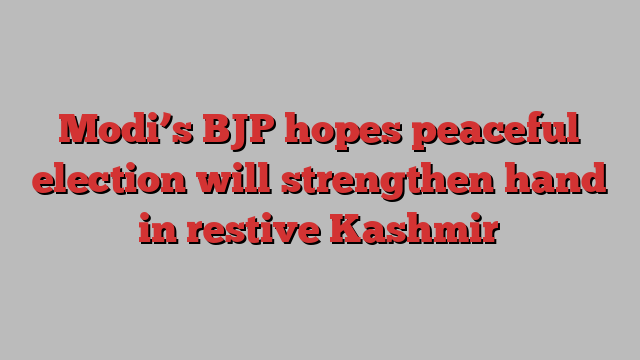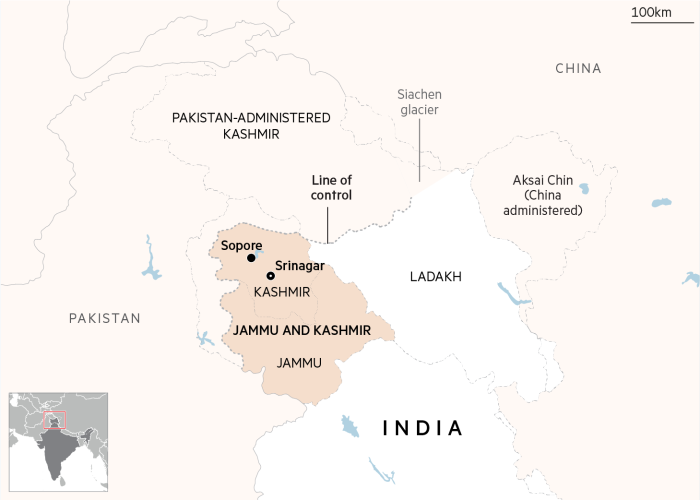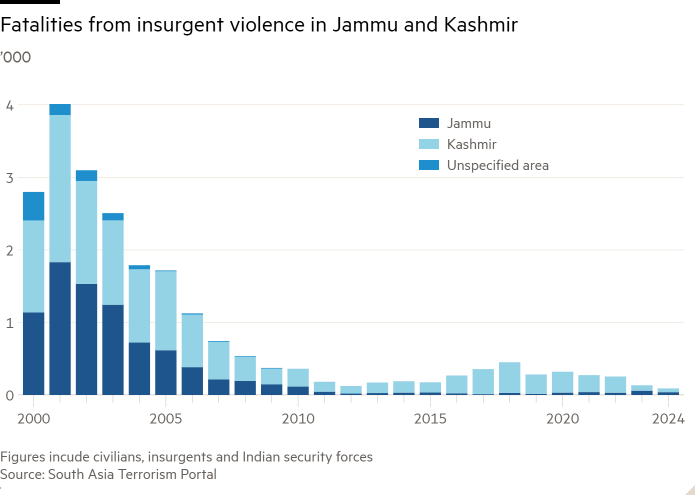
The restive Indian-controlled territory of Jammu and Kashmir is poised for the results of its first regional election since being stripped of autonomy by Narendra Modi in 2019, a contest being closely watched for signs of the future direction of one of Asia’s most intractable conflicts.
Voting closed on October 1 in the Himalayan territory, which is part of a region also claimed and partially controlled by Pakistan and a perennial flashpoint between the nuclear-armed neighbours. The votes will be counted and results announced on Tuesday.
Wrapping up a peaceful election would represent a public relations coup for India’s governing Bharatiya Janata party, which says it has brought peace to Jammu and Kashmir since downgrading what was India’s only Muslim-majority state to a union territory under direct federal rule.
“The peaceful and participative elections are historic wherein democracy is taking root . . . driven by the will of the people of Jammu and Kashmir,” said Rajiv Kumar, India’s chief election commissioner, as voting closed.
Modi’s government five years ago revoked a constitutional article that guaranteed significant regional autonomy to Jammu and Kashmir.
Unlike past regional elections, which were subject to boycott campaigns by Kashmiri separatists, this vote was marked by vigorous campaigning and strong participation by large national parties, smaller regional rivals and independent candidates.
To ensure order during voting, which was carried out in phases beginning last month, paramilitaries in security vehicles mounted with guns patrolled towns that have previously been hotbeds of Kashmiri separatist militancy.

Opposition politicians have accused New Delhi of ruling the disputed region by fear and oppression. After downgrading the state, the government blocked the internet there for months and carried out mass arrests of separatists, activists and others.
“The BJP’s jackboot policy has created fear,” said Tariq Hameed Karra, Jammu and Kashmir president of the Indian National Congress, India’s biggest opposition party. “There’s anger in every part of the state over the legal, constitutional, cultural, religious and economic oppression of the people.”
People are “not allowed to air their grievances”, he said.
Iltija Mufti, a candidate for the regional People’s Democratic party, which wants restoration of statehood and autonomy, said the Modi government had “disempowered and dispossessed” people in the territory.
While deadly encounters between Indian security forces and insurgents remain common, the number of people killed has fallen, according to security analysts.
They said this was in part because Pakistan, which backs Kashmiri separatism, had in the past few years been focused more on Afghanistan and on its own economic problems, according to Ajai Sahni, executive director of the Institute for Conflict Management in New Delhi.
“There is a very sustained downward trend in fatalities because of improvements in Indian security force capabilities and a weakening of the economy and security force capacity in Pakistan,” Sahni said.
According to the institute’s South Asian Terrorism Portal, 134 fatalities among Indian security forces, insurgents and civilians were reported in the region in 2023, down from an average of well over 1,000 per year at the height of the conflict from 1990-2006.

In Sopore, a town in lush northern Kashmir, farm workers took time off from the harvest season to queue early at a polling station surrounded by willow trees used to make cricket bats.
Mohammad Ramzan Ganai, 78, a supporter of Kashmir’s oldest party, the National Conference, said people wanted elected representatives who would defend their basic interests, including seeking the restoration of the territory’s statehood and autonomy. “This vote is different because we want our basic rights back,” Ganai said.
While the election will allow some transfer of power to a 90-seat regional assembly, Jammu and Kashmir’s status as a union territory means New Delhi will have much more direct control than it does in Indian states.
Bringing Kashmir under the same regime as India’s other states has long been a pet project for the BJP. But while Modi has voiced support for restoring statehood, the party has dismissed any suggestion it could give Jammu and Kashmir back substantial autonomy and the special rights previously granted to people defined as permanent residents.
Analysts said New Delhi’s direct rule by handpicked bureaucrats had left a gap in public representation. “People feel a disconnect with governance,” said Nisar Ali, an economist on a central government data committee. “Their motivation is to elect local representatives so that they can access government services through them.”
Intense development of roads and other infrastructure over the past five years has converted swaths of the picturesque mountainous territory into construction sites. But residents complain of high electricity tariffs, drinking water shortages and high unemployment under the current administration, which has had only limited results from its efforts to promote business and inward investment.
A parliamentary committee said in a report last year that about 1.35mn people in the territory — about 8 per cent of the population — were addicted to drugs.
The Jammu and Kashmir election, along with several state ballots across India in coming months, will test popular support for the Hindu nationalist BJP after it lost its majority in the national parliament in June.
The BJP won two seats in Jammu and Kashmir in June, with National Conference also taking two and an independent winning one.
Exit polls — while not always accurate, as June’s parliamentary elections proved — suggested no party or grouping was expected to win a majority in the regional vote. Abhijeet Jasrotia, a local BJP spokesperson, said the party would win “30-plus” of the 43 seats in Hindu-dominated Jammu, and two or three of 47 in Muslim-majority Kashmir.
“We will definitely emerge as the largest grouping, and I hope we are not too far from the halfway mark,” said Omar Abdullah, vice-president of National Conference, which ran a joint campaign with Congress.
Analysts said lasting peace and stability for Jammu and Kashmir would require more than democratic elections. India also needed to improve relations with Pakistan, according to Ali. “We cannot think of the future of Jammu and Kashmir in isolation,” he said.